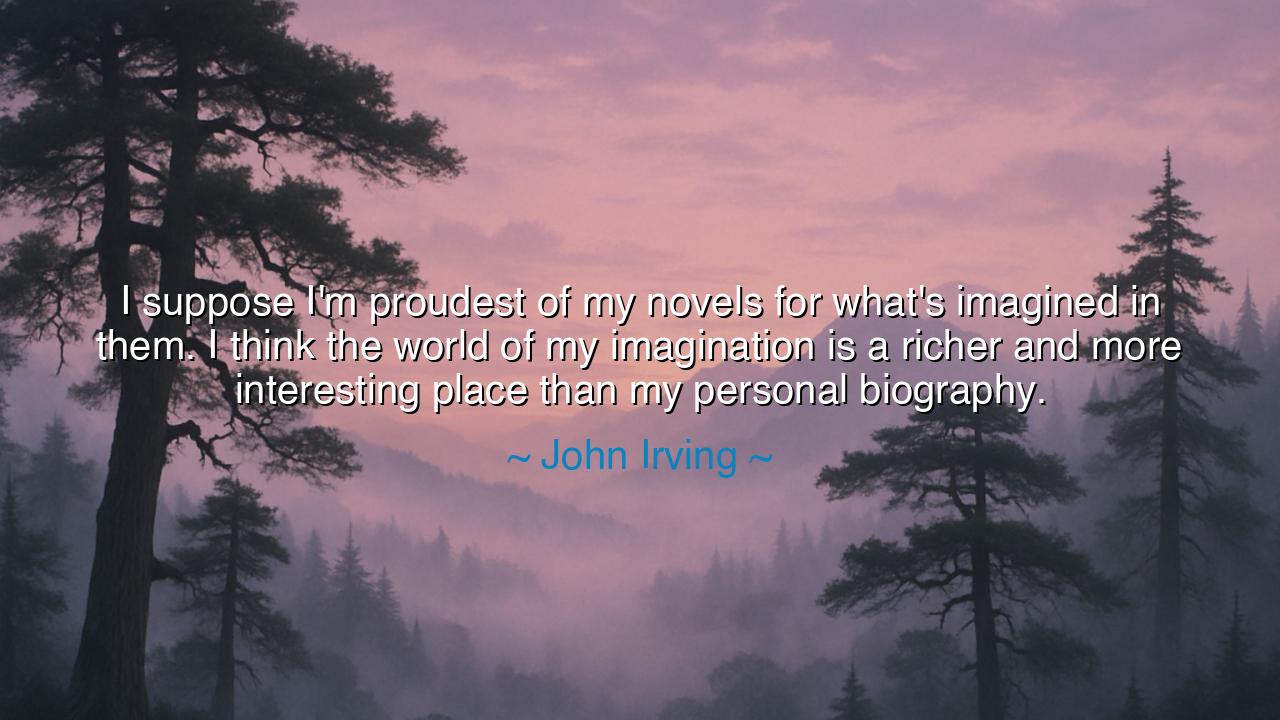
I suppose I'm proudest of my novels for what's imagined in them.
I suppose I'm proudest of my novels for what's imagined in them. I think the world of my imagination is a richer and more interesting place than my personal biography.






“I suppose I'm proudest of my novels for what's imagined in them. I think the world of my imagination is a richer and more interesting place than my personal biography.” – John Irving
There is a quiet nobility in these words — the wisdom of a creator who has learned that the truest life is not always the one lived in flesh and time, but the one imagined in the boundless country of the mind. John Irving, a craftsman of stories and a weaver of human hearts, reminds us that our imagination can build realms far greater than our histories. His confession is not of vanity, but of reverence — for the sacred power of creativity, that divine inheritance which allows mortals to touch eternity. In a world that worships the visible and the measurable, Irving speaks for the unseen — for the life lived in thought, in art, in the endless landscapes of invention.
In this saying, he draws a quiet boundary between biography and imagination, between the life we are given and the one we create. A biography is a record — a chain of events, births, travels, loves, and losses — but imagination is the liberation from that chain. It is where the heart breaks free from mere circumstance and dares to explore what could have been, what might still be, what never was. The world of imagination is not confined by the gravity of reality; it soars, carrying with it the essence of all possibility. To dwell there is to live many lives in one — to feel the sorrow of kings, the wonder of children, the longings of those who never existed except in thought.
And yet, Irving’s statement carries a deeper humility: it is the humility of one who knows that art is larger than the artist. The imagined world outlives its maker, shimmering long after his own story is done. Think of Homer, whose life is mostly lost to time, but whose imagination gave us Achilles, Odysseus, and Helen — figures who still breathe in the collective soul of humankind. No one remembers what Homer ate, where he lived, or how he died. But his imagination became the shared memory of civilization. So too does Irving imply that the worlds we dream are often the truest reflections of who we are — not the facts of our living, but the visions we leave behind.
Consider also the story of Emily Dickinson, who rarely ventured beyond the bounds of her home, yet explored universes within her mind. The world might have called her life small, unadventurous, even lonely. But her poems — born from imagination and inward seeing — opened windows into infinity. Her personal biography was modest; her inner life was vast. Through her words, she captured the lightning of the soul, the trembling of existence itself. In her, as in Irving, we learn that one may live quietly and still change the very language of eternity.
It is tempting, in this modern age, to measure worth by experience — by travels, achievements, or grand narratives. But Irving’s words call us back to an older wisdom: that the richest life is not always the loudest, but the most imaginative. The mind that dares to dream boldly has already lived beyond the confines of time. The warrior fights on battlefields; the dreamer builds worlds in which whole civilizations rise and fall. The artist’s triumph is not over others, but over limitation itself.
What, then, is the lesson we inherit from this reflection? It is that we must cultivate the world within. Do not mourn the simplicity of your days, nor envy those whose biographies seem grand. Instead, water the garden of your imagination. Read deeply, wonder endlessly, and write — if not with pen, then with spirit — the stories that live inside you. For these inner worlds are the true measure of your being, and through them, your soul will outlast your body.
Let every person, then, become both dreamer and chronicler of their own imagined world. When you walk in silence, let your mind travel to far lands; when you speak, let your words breathe new life into the unseen. The life of the body is brief — but the life of imagination is eternal. As John Irving teaches us, your personal biography may fade into dust, but the creations born of your imagination may yet light the path for those who come after you.
So dream boldly. Build your worlds. And be proud, not merely of what you have lived — but of what you have imagined.






AAdministratorAdministrator
Welcome, honored guests. Please leave a comment, we will respond soon